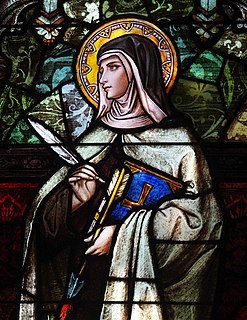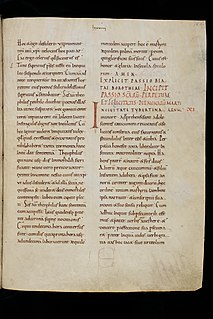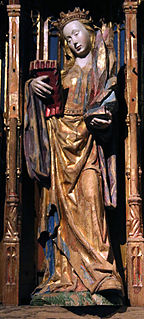Pope Julius I was the bishop of Rome from 6 February 337 to his death on 12 April 352. He is notable for asserting the authority of the pope over the Arian Eastern bishops, as well as a false claim that he set 25 December as the official birthdate of Jesus.

In religious belief, a saint is a person who is recognized as having an exceptional degree of holiness, likeness, or closeness to God. However, the use of the term "saint" depends on the context and denomination. In Catholic, Eastern Orthodox, Anglican, Oriental Orthodox, and Lutheran doctrine, all of their faithful deceased in Heaven are considered to be saints, but some are considered worthy of greater honor or emulation; official ecclesiastical recognition, and consequently a public cult of veneration, is conferred on some saints through the process of canonization in the Catholic Church or glorification in the Eastern Orthodox Church.

The Passion of Saints Perpetua and Felicity is a diary by Vibia Perpetua describing her imprisonment as a Christian in 203, completed after her death by a redactor. It is one of the oldest and most notable early Christian texts.

The calendar of saints is the traditional Christian method of organizing a liturgical year by associating each day with one or more saints and referring to the day as the feast day or feast of said saint. The word "feast" in this context does not mean "a large meal, typically a celebratory one", but instead "an annual religious celebration, a day dedicated to a particular saint".

Veneration, or veneration of saints, is the act of honoring a saint, a person who has been identified as having a high degree of sanctity or holiness. Angels are shown similar veneration in many religions. Philologically, "to venerate" derives from the Latin verb, venerare, meaning 'to regard with reverence and respect'. Veneration of saints is practiced, formally or informally, by adherents of some branches of all major religions, including Christianity, Judaism, Hinduism, Islam, and Buddhism.

A wali, the Arabic word which has been variously translated "master", "authority", "custodian", "protector", is most commonly used by Muslims to indicate an Islamic saint, otherwise referred to by the more literal "friend of God".
Chishtī Muʿīn al-Dīn Ḥasan Sijzī, known more commonly as Muʿīn al-Dīn Chishtī or Moinuddin Chishti or Khwājā Ghareeb Nawaz, or reverently as a Shaykh Muʿīn al-Dīn or Muʿīn al-Dīn or Khwājā Muʿīn al-Dīn by Muslims of the Indian subcontinent, was a Persian Sunni Muslim preacher and Sayyid, ascetic, religious scholar, philosopher, and mystic from Sistan, who eventually ended up settling in the Indian subcontinent in the early 13th-century, where he promulgated the famous Chishtiyya order of Sunni mysticism. This particular tariqa (order) became the dominant Muslim spiritual group in medieval India and many of the most beloved and venerated Indian Sunni saints were Chishti in their affiliation, including Nizamuddin Awliya and Amir Khusrow.

Aḥmad al-Badawī, also known as Al-Sayyid al-Badawī, or as al-Badawī for short, or reverentially as Shaykh al-Badawī by all those Sunni Muslims who venerate saints, was a 13th-century Moroccan Sunni Muslim mystic who became famous as the founder of the Badawiyyah order of Sufism. Originally hailing from Fes, al-Badawi eventually settled for good in Tanta, Egypt in 1236, whence he developed a posthumous reputation as "Egypt's greatest saint." As al-Badawi is perhaps "the most popular of Muslim saints in Egypt", his tomb has remained a "major site of visitation" for Muslims in the region.

Saint Sunniva is the patron saint of the Norwegian Diocese of Bjørgvin, as well as all of Western Norway.
Saint Saturninus may refer to:

Perpetua is a serif typeface that was designed by English sculptor and stonemason Eric Gill for the British Monotype Corporation. Perpetua was commissioned at the request of Stanley Morison, an influential historian of printing and adviser to Monotype around 1925, at a time when Gill's reputation as a leading artist-craftsman was high. Perpetua was intended as a crisp, contemporary design not following any specific historic model, with a structure influenced by Gill's experience of carving lettering for monuments and memorials. Perpetua is commonly used for covers and headings and also sometimes for body text; it has been particularly popular in fine book printing. Perpetua was released with characters for the Greek alphabet and a matching set of titling capitals for headings.
James Mason Donnan III is a former American football player and coach and now a television analyst for college football and a motivational speaker. He served as the head football coach at Marshall University (1990–1995) and the University of Georgia (1996–2000), compiling a career record of 104–40. His 1992 Marshall team won an NCAA Division I-AA national title. Donnan was inducted into the College Football Hall of Fame as a coach in 2009.

Felicitas of Rome, also anglicized as Felicity, is a saint numbered among the Christian martyrs. Apart from her name, the only thing known for certain about this martyr is that she was buried in the Cemetery of Maximus, on the Via Salaria on a 23 November. However, a legend presents her as the mother of the seven martyrs whose feast is celebrated on 10 July. The Eastern Orthodox Church celebrates their martyrdom on 25 January.
Saint Felicity may refer to:

Theodore Stratelates, also known as Theodore of Heraclea (281-319), was a martyr and Warrior Saint venerated with the title Great-martyr in the Eastern Orthodox Church, Eastern Catholic and Roman Catholic Churches and Oriental Orthodox Churches.

Tebourba is a town in Tunisia, located about 20 miles (30 km) from the capital Tunis, former ancient city and bishopric, now a Latin Catholic titular see.

Felicity is an English feminine given name meaning "happiness". It is derived from the Latin word felicitas meaning "luck, good fortune". It is also used as a form of the Latin name Felicitas, taken from the name of the Ancient Roman goddess Fortuna. It was also the name of Saint Felicity of Rome, a 2nd-century saint venerated by the Roman Catholic Church. Felicia, a related name, is a feminine form of the name Felix, which is derived from an Ancient Roman cognomen meaning "lucky," or "successful." Its diminutive is Flick.

March 6 - Eastern Orthodox liturgical calendar - March 8

Perpetua and Felicity were Christian martyrs of the 3rd century. Vibia Perpetua was a recently married well educated noblewoman, said to have been 22 years old at the time of her death, and mother of an infant she was nursing. Felicity, a slave imprisoned with her and pregnant at the time, was martyred with her. They were put to death along with others at Carthage in the Roman province of Africa.












